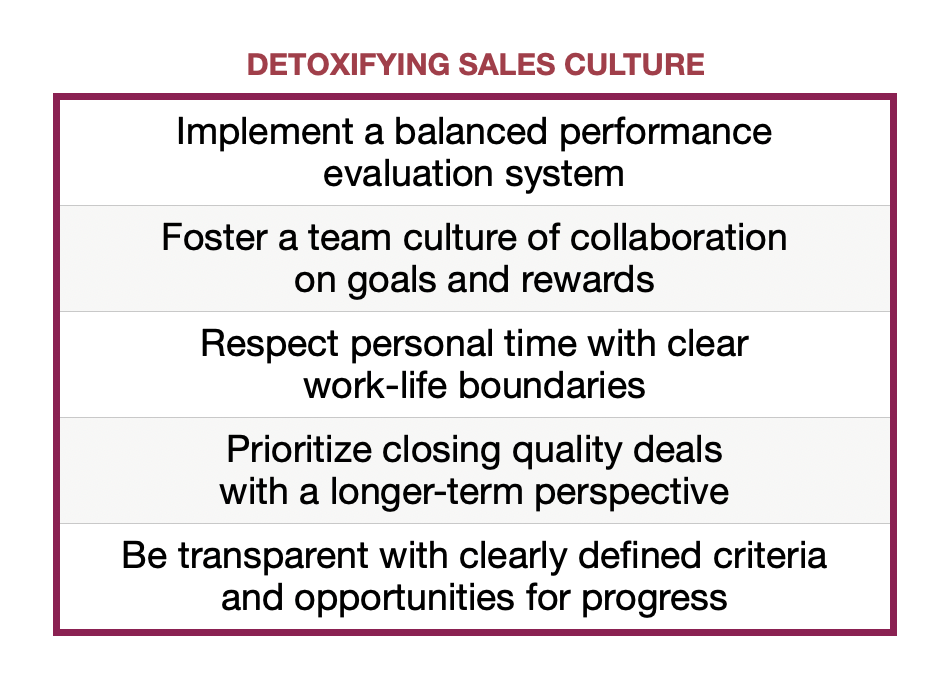
With staff churn in sales at 35% and rising, you’re likely blaming the Great Resignation – or those younger reps preferring to chill out than hold down a job long term (the Big Quit). It’s much more difficult to swallow the fact that one cause of high turnover is a toxic sales culture.
It’s too close to home to think about! You’ve been in sales leadership for years and taught your teams the best strategies you know for winning at the sales game. Your figures are looking good and the reps are working hard.
But things have been changing on the quiet. The younger generations coming through – Millennials and Gen Z in particular – and even some older staff expect something very different to what was once acceptable in the office.
Why do they work? Obviously for money, yes. But what drives them? That’s the crucial question today.
Your team can’t motivate themselves if they’re resentful, frustrated, bored, or just turned off by the atmosphere at work. They want autonomy, mastery, and clarity of purpose.
So – let’s eavesdrop on some reps who’ve been quietly
- talking to themselves about their concerns and
- looking for an escape from what they see as a toxic culture at work.
What’s going on for them? And, more importantly, what are the solutions?
Toxic Sales Culture #1: High-Pressure Quotas
“I feel like I’m constantly racing against the clock to hit my quota.”
According to Gallup, employee stress is at an all-time high this year. No one can work at their best if they spend sleepless nights worrying about tomorrow’s quotas. If their compensation package depends solely on meeting quotas, this affects the quality of their work and leads to a toxic sales culture.
Solution:
Try to implement a more balanced performance evaluation system – one that considers not just quotas but also customer satisfaction, relationship-building, and other long-term metrics.
There’s more to sales success than ticking off quotas. If you bring in a balanced framework for thinking about success, you’re also relieving stress among your reps.
Help them share moments when they felt they had time to do a good job whatever the result, such as satisfying a prospect’s potential objection, even if the deal is not yet closed.
Toxic Sales Culture #2: Cutthroat Competition
“I’m hesitant to share any tips or insights with my colleagues because it feels like we’re all competing for the same limited pool of clients.”
In times past, it worked quite well to have individual targets and assess each rep on their results. That’s still valid – to a point. But in today’s market place with multi-touch points and increased consumer demands and preferences, having your reps competing with each other is counterproductive.
Solution:
The best way forward when things move fast is to employ the skills of your whole team together.
This is much healthier for retaining your talent. Each rep has good skills and less good skills. They can help with what they excel at and learn from each other when they need to.
So foster a culture of collaboration by setting team-based goals and rewards, and encouraging knowledge sharing through regular team meetings or internal forums.
Toxic Sales Culture #3: Lack of Work-Life Balance
“I’m expected to be available 24/7, answering emails and calls even during my ‘off’ hours.”
Years ago, work-life balance didn’t exist as a phrase. But it’s here to stay, mostly due to technological advances. Constantly being on call leads to burnout. Working from home has made the dividing line worse.
Solution:
Make it a policy to respect personal time. This means establishing clear boundaries for work hours and encouraging employees to rest and rejuvenate outside of those hours. Before interrupting their personal time, ask yourself if the information you’re seeking is urgent or if there is another source for the information, such as your CRM.
In addition, get to know what leisure time looks like for each rep! They respect you if you take an interest in them as people.
Toxic Sales Culture #4: Short-Term Focus
“I feel pressured to close deals quickly, even if it’s not in the best interest of the customer.”
You’re lucky if you have reps who understand that customer-centricity matters! Customers today can easily walk away from pressured selling. The ball’s securely in their court.
However, if your reps feel the need to close deals before the customer is ready, there’s a backlash. Firstly from the customer who will not return. And secondly from the rep – who will quickly begin to feel the toxicity of working in an environment where they feel that
- their values don’t fit in and
- they were forced to do a poor job and ignore the real needs of the customer.
Solution:
What’s needed here is a review of what quality in sales really is, and how you can encourage it.
Often quality relies on closing valuable deals with an eye to future return business and higher revenues overall.
So – if you shift the focus from just closing deals to building long-term relationships that respect the individual needs of customers, this culture will feel more satisfying to your teams and less toxic.
The trick is to train your sales reps in consultative selling techniques that prioritize customer needs and balance business needs with those. Younger generations, especially, want to feel they have a purpose that’s worthwhile and that they’ve achieved something valuable in life, both for you and the customer, when they close a deal.
Toxic Sales Culture #5: Inequality and Favoritism
“It’s demoralizing to see the same few people get the best leads and opportunities.”
There’s always going to be an element of lead distribution that can seem unfair. After all, you have staff good at one sort of lead, and others better at other sales tasks. It’s only demoralizing if your reps are kept in the dark about how your sales operations work.
It’s also worth considering that today’s reps expect more sense of equality even if they’re junior in experience status. When they see what appears to be unfairness or favoritism, they begin to feel the office culture is “toxic” in some way, and they think of leaving.
Solution:
Implement a transparent system for lead distribution and opportunity allocation. Make sure that rewards and recognitions are based on merit and clearly defined criteria. This helps establish an effective sales culture where everyone has the opportunity to learn, progress, and be empowered for success.
And if you also move towards greater teamwork (#2 above), all your reps will feel they’ve played a part in the big wins.
360 Consulting Can Help You Improve Your Sales Systems
No one can work well in a broken or splintered system. If your office is losing reps regularly, don’t only consider the great Resignation or the Big Quit but also analyze your office culture.
Has one of the above toxic elements infiltrated your sales environment? Would you like to encourage a more modern and effective sales culture?
If so, give us a call for a free consultation. Working with 360 Consulting is easy! We can help you tune out any toxic sales culture so you retain all the best talent and leave your competitors standing! Let’s talk!

